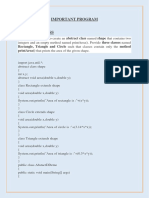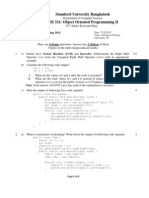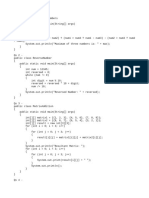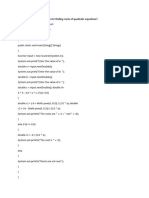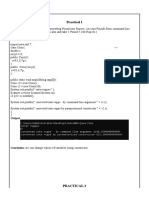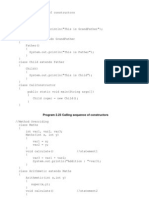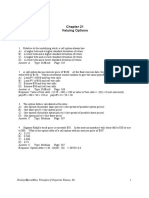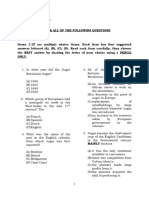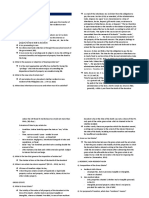0% found this document useful (0 votes)
111 views8 pagesJava Programming Tutorial Solutions
This document contains solutions to 6 questions related to Java programming concepts like abstract classes, exceptions, inheritance, and division by zero errors. The questions cover topics such as determining the output of code snippets, defining classes to satisfy an abstract class, calculating total area by treating different shape types as a common type, identifying which exception types would be produced by different method calls, determining if code snippets can be legally inserted into a class that extends another, and handling division by zero errors with a custom exception.
Uploaded by
Bahoush_Barhou_6812Copyright
© Attribution Non-Commercial (BY-NC)
We take content rights seriously. If you suspect this is your content, claim it here.
Available Formats
Download as PDF, TXT or read online on Scribd
0% found this document useful (0 votes)
111 views8 pagesJava Programming Tutorial Solutions
This document contains solutions to 6 questions related to Java programming concepts like abstract classes, exceptions, inheritance, and division by zero errors. The questions cover topics such as determining the output of code snippets, defining classes to satisfy an abstract class, calculating total area by treating different shape types as a common type, identifying which exception types would be produced by different method calls, determining if code snippets can be legally inserted into a class that extends another, and handling division by zero errors with a custom exception.
Uploaded by
Bahoush_Barhou_6812Copyright
© Attribution Non-Commercial (BY-NC)
We take content rights seriously. If you suspect this is your content, claim it here.
Available Formats
Download as PDF, TXT or read online on Scribd
/ 8








